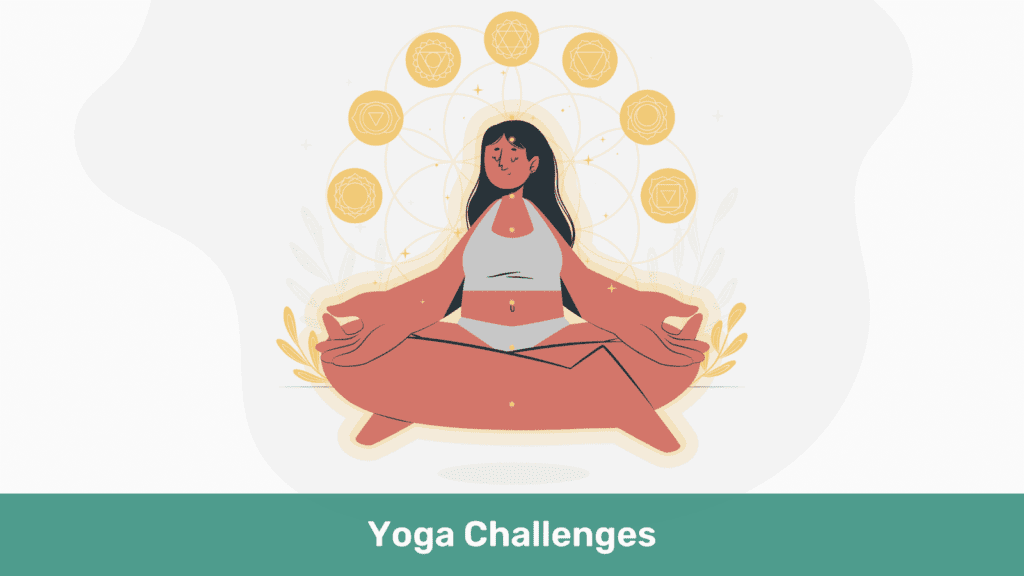Introduction
Yoga challenges offer an excellent opportunity to experience the myriad benefits that this ancient practice brings to both mind and body. As highlighted by the National Institutes of Health (NIH), engaging in yoga regularly can lead to major improvements in body flexibility and balance, significantly reduce stress levels, enhance overall quality of life, assist in maintaining body weight, and boost immunity power. With this in mind, our 21-Day Yoga Challenge for Stress Relief is designed to not only alleviate stress but also to improve your overall well-being. Whether you are new to yoga or looking to deepen an existing practice, this challenge provides a comprehensive approach to exploring the diverse benefits of yoga, guiding you through a transformative journey over three weeks.
Preparation for Yoga Challenges
As you embark on yoga challenges, it’s essential to create an optimal environment and have the right tools to support your practice. Here’s how you can prepare effectively to make the most of your yoga challenges:
-
-
Creating a Comfortable Yoga Space for Challenges:
- Identify a tranquil and comfortable spot in your home dedicated to your yoga challenges. A quiet, interruption-free area is ideal.
- Keep the space tidy and inviting. Consider enhancing the atmosphere with calming elements like plants, soothing colors, or soft background music to enrich your yoga challenges experience.
-
Choosing the Right Yoga Mat for Challenges:
- A good-quality yoga mat is vital for yoga challenges. Look for one with enough cushioning for comfort and a non-slip surface for safety.
- Consider the thickness of the mat – thicker mats offer more cushioning which can be beneficial for joint comfort during your yoga challenges.
-
Essential Props for Yoga Challenges:
- Equip yourself with useful yoga props like blocks and straps, which are especially helpful in yoga challenges for beginners. These aids can help in achieving proper alignment and deeper stretches.
- Additionally, a yoga blanket or bolster can be beneficial for certain restorative poses and relaxation segments in your yoga challenges.
-
Scheduling Your Yoga Challenges:
- Consistency is crucial in reaping the benefits of yoga challenges. Set aside a specific time each day for your practice to establish a routine.
- If you have a fluctuating schedule, planning your yoga challenges a week in advance and setting reminders can help in maintaining regularity.
-
Properly preparing for your yoga challenges not only facilitates a more effective and enjoyable practice but also ensures you stay committed and motivated throughout your journey. With a dedicated space, the right equipment, and a consistent schedule, you’ll be well-prepared to embrace and conquer these challenges.
Week 1: Foundations and Gentle Start for Yoga Challenges
The first week of yoga challenges is all about laying a strong foundation with gentle yoga poses and breathing exercises, especially suitable for beginners. This week focuses on grounding poses and mindfulness practices, setting the tone for stress relief and inner calm.
-
-
Day 1: Introduction to Breathing Techniques
- Start with basic pranayama exercises like Dirga Pranayama (Three-Part Breath) to cultivate deep, mindful breathing.
- Theme: Awareness. Focus on becoming aware of each breath and its path through your body.
-
Day 2: Gentle Stretching and Warm-Up
- Incorporate gentle stretches like neck rolls, shoulder stretches, and side bends to warm up the body.
- Theme: Flexibility. Emphasize the importance of listening to your body and moving within comfortable limits.
-
Day 3: Basic Standing Poses
- Practice foundational standing poses like Tadasana (Mountain Pose) and Vrksasana (Tree Pose) for balance and grounding.
- Theme: Stability. Find stability in your poses and in your mind.
-
Day 4: Seated Poses and Forward Bends
- Include seated poses like Dandasana (Staff Pose) and gentle forward bends such as Paschimottanasana (Seated Forward Bend).
- Theme: Release. Focus on releasing tension with each forward bend.
-
Day 5: Gentle Backbends and Chest Openers
- Practice gentle backbends like Bhujangasana (Cobra Pose) to open the chest and counteract the common forward hunch.
- Theme: Opening. Open your body and heart to new experiences.
-
Day 6: Introduction to Mindfulness Meditation
- Engage in a simple mindfulness meditation, focusing on the breath or a mantra to calm the mind.
- Theme: Presence. Be present in the moment, letting go of external stressors.
-
Day 7: Integration and Relaxation
- End the week with an integration practice, combining the learned poses, followed by Savasana (Corpse Pose) for deep relaxation.
- Theme: Harmony. Reflect on the week’s practice and the harmony between body and mind.
-
This first week of the yoga challenges is designed to gently introduce you to the practice, encouraging mindfulness and a focus on stress relief. It sets a solid foundation for more advanced practices in the following weeks while emphasizing the importance of a gentle, nurturing approach to yoga.
Week 2: Building Mind-Body Awareness in Yoga Challenges
In the second week of the yoga challenges, the focus shifts to enhancing mind-body awareness. This week, you’ll be introduced to slightly more challenging poses that encourage body awareness and mindfulness. The practices this week aim to deepen the connection between physical movement and mental focus.
-
-
Day 8: Engaging Core Strength
- Start with poses that engage the core, like Marjaryasana-Bitilasana (Cat-Cow Pose) and Plank Pose, to build strength and stability.
- Theme: Centering. Concentrate on engaging and strengthening your core, the center of your physical and mental balance.
-
Day 9: Dynamic Movements
- Incorporate dynamic movements like gentle Sun Salutations to link breath with motion.
- Theme: Fluidity. Emphasize the smooth transition between poses, mirroring the flow of breath.
-
Day 10: Standing Balancing Poses
- Practice balancing poses such as Vrksasana (Tree Pose) with variations to challenge stability.
- Theme: Equilibrium. Find your balance in the poses and in your thoughts.
-
Day 11: Twisting Poses for Detoxification
- Introduce gentle twisting poses like Ardha Matsyendrasana (Half Lord of the Fishes Pose) to aid detoxification and improve spinal flexibility.
- Theme: Release. Use twists to release tension and toxins from the body and mind.
-
Day 12: Hip Openers
- Practice hip-opening poses such as Eka Pada Rajakapotasana (Pigeon Pose) to release emotional tension stored in the hips.
- Theme: Letting Go. Focus on letting go of stored emotions and opening up to new possibilities.
-
Day 13: Mindful Movement Practice
- Engage in a session of mindful movement, paying close attention to each muscle and movement.
- Theme: Awareness. Cultivate a heightened awareness of the body’s movements and sensations.
-
Day 14: Guided Meditation and Relaxation
- End the week with a guided meditation or a deep relaxation technique like Yoga Nidra to calm the mind and integrate the week’s practices.
- Theme: Integration. Reflect on the mind-body connection and the integration of your physical and mental practices.
-
This second week of yoga challenges is designed to build upon the foundation laid in the first week, bringing a deeper sense of awareness to both the mind and body. By the end of this week, you should start feeling more in tune with your body’s movements and more mentally focused during your practice.
Week 3: Deepening the Practice in Yoga Challenges
In the third week of the yoga challenges, the focus is on deepening your practice by gradually introducing more strength and balance poses, while still maintaining an emphasis on relaxation. This week also introduces sequences specifically targeted for stress relief, such as restorative yoga and yoga nidra.
-
-
Day 15: Building Strength with Asanas
- Incorporate stronger poses like Adho Mukha Svanasana (Downward-Facing Dog) and Virabhadrasana (Warrior Pose) to build muscle strength.
- Theme: Resilience. As you strengthen your body, also focus on building mental resilience.
-
Day 16: Advanced Balance Poses
- Challenge your balance with poses like Garudasana (Eagle Pose) and Natarajasana (Dancer’s Pose).
- Theme: Stability. Concentrate on achieving physical and emotional stability through these poses.
-
Day 17: Restorative Yoga for Relaxation
- Introduce restorative yoga poses, using props like bolsters and blocks, to deeply relax the body and mind.
- Theme: Tranquility. Use this practice to find peace and tranquility amidst the challenges.
-
Day 18: Yoga Nidra for Deep Relaxation
- Practice Yoga Nidra, a guided meditation that promotes deep relaxation and stress relief.
- Theme: Release. Let go of deep-seated stress and tension through this meditative practice.
-
Day 19: Combining Strength and Flexibility
- Blend strength-building poses with flexibility exercises, creating a well-rounded practice.
- Theme: Harmony. Find the balance between strength and flexibility, hardness and softness.
-
Day 20: Journaling and Reflection
- Spend time journaling or reflecting on your progress, noting changes in your stress levels and overall well-being.
- Theme: Self-awareness. Use this time to cultivate deeper self-awareness and mindfulness.
-
Day 21: Integration and Celebration
- Conclude the challenge with a session that integrates all you’ve learned and practiced over the past three weeks.
- Theme: Achievement. Celebrate your dedication and the progress you’ve made in your yoga journey.
-
This third week of yoga challenges aims to deepen your practice, offering tools for both physical and mental well-being. The combination of strength-building, balance, and relaxation techniques, along with reflective practices like journaling, helps to create a holistic yoga experience, leaving you with enhanced physical strength and a more peaceful mind.
Daily Practice Structure in Yoga Challenges
Having a structured approach to each day’s practice in yoga challenges can significantly enhance the effectiveness and enjoyment of your yoga routine. A well-structured session typically includes a warm-up, core practice, cool-down, and meditation or relaxation. Here’s a breakdown of how you might structure your daily yoga practice:
-
-
Warm-Up (5-10 minutes):
- Begin with gentle movements to warm up the body. This can include easy stretches, neck rolls, arm circles, and gentle twisting movements.
- Focus on loosening up the major joints and muscles, preparing them for more intensive practice.
-
Core Practice (20-30 minutes):
- This is the main part of your practice where you perform a series of yoga asanas (poses).
- For a balanced practice, include a mix of different types of poses: standing poses, balance poses, forward bends, backbends, and twists.
- Pay attention to your breathing, trying to maintain a smooth and even breath throughout your practice.
-
Cool-Down (5-10 minutes):
- Gradually slow down the pace of your practice. Include gentle stretches and slower movements.
- Poses like forward bends and gentle twists are great for cooling down. This helps in gradually lowering the heart rate and calming the body.
-
Meditation and Relaxation (5-10 minutes):
- Conclude your practice with a meditation or relaxation technique. This could be a seated meditation, a lying-down relaxation like Savasana (Corpse Pose), or a guided Yoga Nidra session.
- Use this time to relax the mind, deepen your breathing, and absorb the benefits of your yoga practice.
-
Remember, the key to a successful yoga challenge is consistency and listening to your body. Modify the structure as needed based on your daily energy levels and time constraints. This daily structure is just a guideline; feel free to adapt it to fit your individual needs and preferences in your yoga journey.
Nutrition and Hydration Tips for Yoga Challenges
Nutrition and hydration play a critical role in enhancing the benefits of yoga challenges, especially when it comes to stress reduction and overall well-being. Here are some dietary and hydration tips to complement your yoga practice:
-
-
Balanced and Nourishing Diet:
- Aim for a balanced diet rich in whole foods. Incorporate a variety of fruits, vegetables, whole grains, lean proteins, and healthy fats.
- Foods like leafy greens, nuts, seeds, avocados, and oily fish are high in magnesium and omega-3 fatty acids, which are known to reduce stress levels.
-
Foods for Stress Reduction:
- Consume foods rich in antioxidants and phytonutrients, which can help combat the physical effects of stress. Berries, dark chocolate, and green tea are good options.
- Consider foods high in B vitamins, such as whole grains and legumes, which are known to help with mood regulation and stress management.
-
Pre and Post-Yoga Nutrition:
- Before yoga, opt for a light snack that is easy to digest, like a piece of fruit or a small yogurt, to give you energy without feeling heavy.
- After yoga, choose a meal or snack that combines protein and carbohydrates to aid muscle recovery and replenish energy stores. A smoothie or a whole-grain sandwich with lean protein are good choices.
-
Staying Hydrated:
- Hydration is crucial for overall health and can significantly impact stress levels. Ensure you drink plenty of water throughout the day.
- Carry a water bottle during your yoga practice and take small sips as needed, especially during more intense sessions.
-
Also Read: 30-Day Water Challenge
-
-
Mindful Eating:
- Practice mindful eating by paying attention to your hunger and fullness cues. Eat slowly and savor your food, which can help in better digestion and stress reduction.
- Try to make mealtime a relaxing experience, free from distractions like TV or work.
-
Remember, nutrition and hydration are integral parts of your overall yoga practice. They not only fuel your body but also affect your mental and emotional state, contributing to a more effective and enjoyable yoga experience.
Mindfulness and Meditation in Yoga Challenges
Incorporating mindfulness and meditation into your daily routine is a vital component of yoga challenges, enhancing the benefits of yoga both on and off the mat. These practices help deepen your yoga experience, bringing a sense of calm and increased awareness into everyday life.
-
-
Integrating Mindfulness:
- Begin by incorporating mindfulness into your yoga practice. Pay attention to your breath, body sensations, and movements during each pose.
- Carry this mindfulness into daily activities. Be present in the moment, whether you’re eating, walking, or simply resting.
-
Daily Meditation Practice:
- Dedicate a specific time each day for meditation, even if it’s just for a few minutes.
- Use guided meditations, focusing on the breath or a mantra, to help train your mind to be calm and present.
-
Breath Awareness:
- Throughout the day, take a few moments to focus on your breathing. Deep, conscious breathing can help reduce stress and bring your attention back to the present moment.
-
Mindful Movement:
- Incorporate mindfulness into other physical activities. Whether you’re doing household chores or exercising, be aware of your body’s movements and how they feel.
-
Mindful Eating:
- Practice eating without distractions. Pay attention to the flavors, textures, and sensations of your food, as well as your body’s hunger and fullness cues.
-
Mindfulness in Interaction:
- Be fully present during conversations and interactions with others. Listen actively and engage without judgment.
-
Bedtime Mindfulness and Meditation:
- End your day with a mindfulness or meditation practice to help unwind and promote restful sleep. This could be a gentle body scan or gratitude meditation.
-
Incorporating mindfulness and meditation into your daily life as part of yoga challenges helps in creating a balanced lifestyle. These practices can lead to enhanced mental clarity, reduced stress, and a greater sense of peace and well-being.
Maintaining Practice Post-Challenge
As the 21-day yoga challenge concludes, it’s important to consider how to sustain and evolve your yoga practice. Continuing with yoga beyond the challenge is crucial for long-term benefits. Here are some tips to help you maintain your practice and stay motivated:
-
-
Set New Goals:
- Reflect on your achievements during the challenge and set new goals for your ongoing practice. These could be improving certain poses, increasing practice frequency, or exploring meditation deeper.
-
Develop a Routine:
- Create a regular yoga schedule that fits into your daily life. Consistency is key, so choose times that are realistic and manageable for you.
-
Explore Different Yoga Styles:
- Expand your practice by exploring various yoga styles. Try Vinyasa for more dynamic movements, Iyengar for precise alignment, or Kundalini for a spiritual and physical challenge.
-
Join Yoga Classes or Workshops:
- Attending classes at a studio or participating in workshops can introduce you to new techniques and foster a sense of community. It also provides an opportunity to learn from different instructors.
-
Incorporate Yoga into Your Lifestyle:
- Make yoga more than just a physical practice. Incorporate the principles of yoga, such as mindfulness and breath awareness, into your daily life.
-
Use Online Resources:
- Take advantage of online yoga classes and tutorials for flexibility in your practice. Many platforms offer a wide range of styles and levels.
-
Yoga Retreats and Events:
- Consider attending a yoga retreat or community yoga event. These can be refreshing experiences that deepen your practice and connect you with like-minded individuals.
-
Practice with Friends or Family:
- Involve friends or family members in your practice. Sharing your yoga journey can be motivating and rewarding.
-
Track Your Progress:
- Continue journaling or tracking your progress. Reflecting on your growth can be a powerful motivator.
-
Stay Curious and Open-Minded:
- Keep an open mind and stay curious about your yoga journey. Be willing to try new poses, techniques, and philosophies.
-
Remember, the end of the yoga challenge is just the beginning of a lifelong journey with yoga. Continuing your practice will help you maintain the physical, mental, and emotional benefits you’ve gained and open the door to deeper exploration and discovery in yoga.
Conclusion
As we conclude the 21-day yoga challenge, it’s important to reflect on the journey you’ve embarked upon. This challenge has not only introduced you to the transformative power of yoga for stress relief but has also laid the groundwork for a sustainable and enriching yoga practice. The benefits you’ve experienced – improved flexibility, enhanced mental clarity, reduced stress levels, and a deeper sense of inner peace – are just the beginning of what yoga can offer.
Throughout these three weeks, you’ve learned how yoga is much more than just a series of physical poses; it’s a holistic practice that encompasses mental, emotional, and physical well-being. The skills and habits you’ve developed – mindfulness, breath control, and a balanced approach to physical exercise – are tools that will continue to serve you well in managing stress and navigating life’s challenges with greater ease and resilience.
As you move forward, remember that the journey of yoga is a continuous one, rich with opportunities for growth and discovery. Embrace yoga as a lifelong companion, a practice that evolves and deepens with time, always offering new insights and pathways to wellness.
In your ongoing yoga journey, consider leveraging resources like Woliba to further enhance your experience. Woliba offers a platform that can help you maintain the momentum you’ve built during this challenge. With features that support wellness initiatives, including yoga practices, Woliba can be your ally in sustaining a regular yoga routine, tracking your progress, and staying connected with a community of like-minded individuals. Utilize such resources to continue nurturing your yoga practice, embracing its holistic benefits, and integrating its principles into every aspect of your life. Contact us today!









